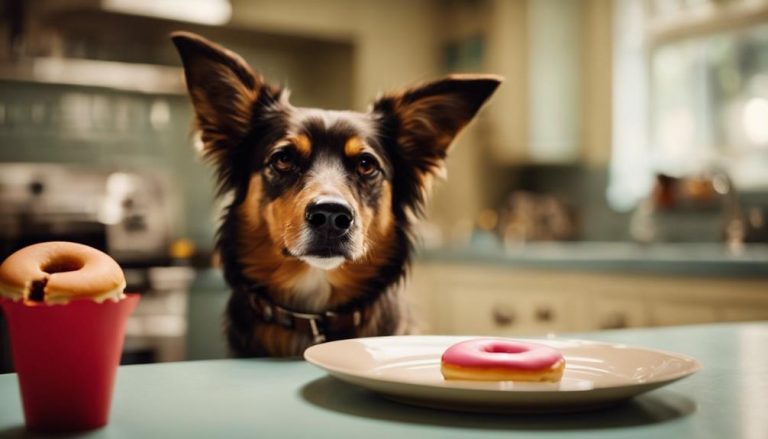Are Doughnuts Safe for Dogs?
Giving dogs doughnuts is not a good idea because it’s harmful and can lead to serious health problems. The high levels of fat and sugar in doughnuts can cause dogs to become overweight and develop dental issues. These treats can also lead to more dangerous conditions like pancreatitis.
Doughnuts might contain ingredients that are poisonous to dogs, such as chocolate, xylitol, and some types of nuts and raisins. Eating these can cause vomiting, diarrhea, tiredness, and a bloated stomach in dogs, which requires an urgent visit to the vet. It’s better to choose safe and healthy snacks to keep your dog in top shape.
Knowing the risks associated with feeding dogs doughnuts is a key part of taking good care of your pet. This awareness is crucial for protecting your dog’s health.
Key Takeaways
- Doughnuts are unhealthy for dogs, causing obesity and other health issues.
- Chocolate or xylitol in doughnuts can poison dogs.
- Safe treats like cooked turkey are better for dog health.
Doughnut Dangers for Dogs

Doughnuts are a favorite treat for many people, but they’re not safe for our canine friends. These sweet snacks are packed with fat and sugar, which are harmful to dogs, and some even contain cocoa—a definite no-no because it’s poisonous to them. Eating doughnuts can cause dogs to have stomach problems and, in worse cases, lead to pancreatitis. This is a serious condition that requires immediate medical attention.
Cocoa, found in chocolate, is especially dangerous for dogs, leading to severe health issues if ingested. Besides, doughnuts have a lot of refined sugar, which dogs don’t need at all. This can cause them to gain weight and develop dental problems. As pet owners, we need to be aware of these risks and keep our dogs away from doughnuts, no matter how much they beg. It’s our job to keep them healthy and safe.
Identifying Harmful Ingredients
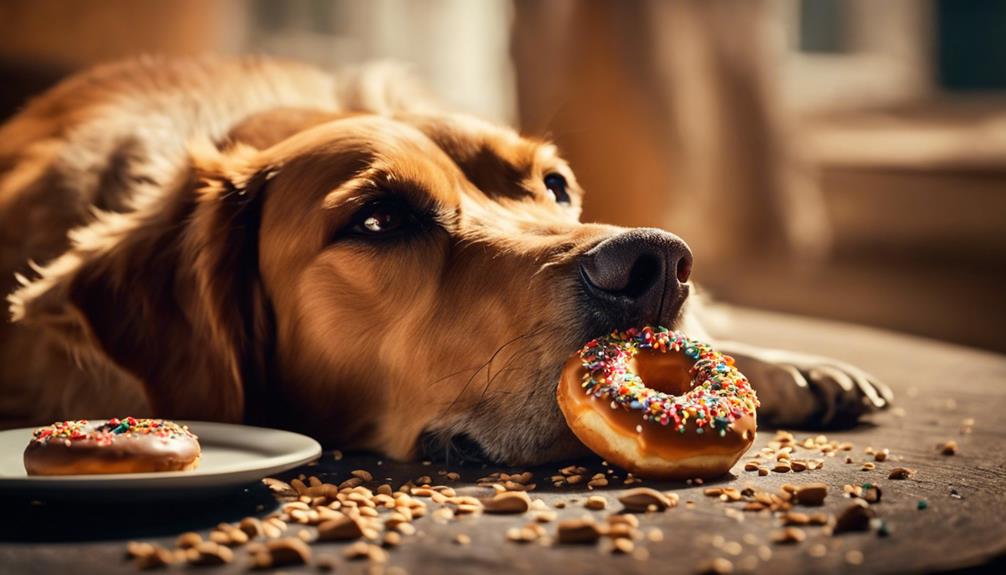
When you’re thinking about treating your dog to a doughnut, it’s crucial to know which ingredients could harm them. Chocolate is a big no-no for dogs, especially the dark kind, so doughnuts with chocolate or chocolate chips are off-limits for your pet. Sweeteners like xylitol are very dangerous for dogs, as they can quickly lower a dog’s blood sugar and cause serious health issues.
Some toppings and fillings, such as nuts and raisins, are harmful to dogs as well. Before giving a piece of doughnut to your dog, make sure it doesn’t contain any of these risky ingredients. These can cause everything from stomach problems to conditions that could be fatal.
It’s about keeping our pets safe by paying attention to what we feed them. This means avoiding certain treats that could lead to health problems.
Immediate Steps After Ingestion

If a dog eats a doughnut, it’s vital to check how they’re doing for any signs of discomfort or odd behavior right away. Should the dog seem really unwell or in pain, getting in touch with a vet as soon as possible is a must.
Watch your dog closely for a few hours after they’ve eaten the doughnut to make sure they stay healthy and figure out if they need any more medical help.
Assess Dogs Condition
After a dog eats a doughnut, it’s important to quickly check for any health issues. Look for symptoms like vomiting, diarrhea, or any sign of discomfort. This helps figure out how upset the dog’s stomach is and what to do next.
Vomiting or diarrhea could be a sign that the dog’s body is reacting to the sugar, fat, or something else in the doughnut that dogs shouldn’t eat. If the dog seems uncomfortable, is bloated, or keeps trying to vomit, these are clear signs of distress.
In cases where the dog has a mild stomach issue or diarrhea, you might consider using Pepto Bismol. However, it’s vital to talk to a vet first to make sure it’s safe for your dog.
If your dog is having these problems, it might be best to not feed them for 12 hours and watch them closely. This approach can help manage the situation and ensure the dog’s health isn’t at risk.
Contact Veterinarian Immediately
If your dog eats a doughnut, it’s crucial to contact your veterinarian right away.
The type of doughnut matters significantly because a chocolate doughnut could be deadly for dogs, while a plain cake doughnut might be less concerning.
Even if your dog isn’t showing symptoms immediately, getting advice from a vet is a wise step to ensure their safety and health.
It’s also a good idea to talk about dog-safe treat options to avoid future scares.
Quick action is key to keeping your pet safe, underscoring the value of professional advice after your dog eats a doughnut.
Monitor Dog Closely
After your dog eats a doughnut, you need to keep a close eye on them for any unusual behavior such as throwing up or loose stools. Acting quickly is key to help them feel better and protect their health.
Stop giving your dog food for 12 hours. This break gives their stomach a chance to calm down and can prevent further issues. If your dog starts having diarrhea, you might think about giving them Pepto Bismol, but only do this if your vet says it’s okay. This medicine can ease their stomach pain.
Stay alert to any new or worsening symptoms. If you notice anything concerning, don’t hesitate to reach out to your vet for advice on how to help your dog recover from eating a doughnut.
Symptoms to Monitor
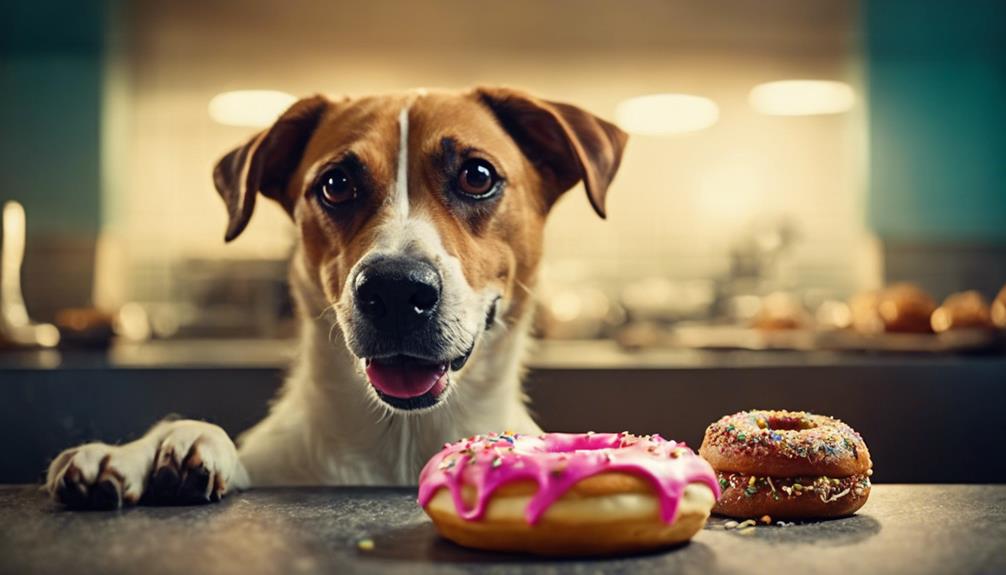
After eating doughnuts, dogs might show several symptoms that need immediate attention from their owners. Vomiting and diarrhea are common signs, along with unusual behavior changes.
It’s crucial for dog owners to keep an eye on these issues, especially if they point to serious conditions like pancreatitis. Consulting a vet is necessary if any worrying symptoms appear.
Common Digestive Issues
When dogs eat donuts, vomiting and diarrhea are common signs that something’s wrong. These treats can trigger pancreatitis, a serious condition marked by intense vomiting and little to no appetite due to the high fat. Other signs your dog might be struggling include looking uncomfortable, bloating, eating grass, or trying to vomit. Dogs that are older, carry extra weight, or have had pancreatitis before are more likely to have these problems.
Watching your dog closely for any unusual behavior or signs of pain right after they’ve eaten a donut is crucial. If these symptoms don’t go away or get worse, it’s important to talk to a vet as soon as possible. Knowing which dogs are more likely to get sick from eating donuts can help prevent these issues or catch them early.
Behavioral Changes Observed
Noticing changes in your dog’s behavior like lethargy or not wanting to eat can be a red flag, especially if they’ve eaten donuts. These signs, including vomiting, diarrhea, looking uncomfortable, and a swollen belly, show they might not be handling their treat well. Dogs acting restless, eating grass, or drooling a lot could be having stomach troubles, so keep an eye on them.
These symptoms, especially if they don’t go away, mean your dog should see a vet soon to avoid worse health problems. It’s crucial for dog owners to spot these signs quickly. They tell you your dog is having a hard time with what they ate, and a vet’s help is needed to look after your dog’s health.
Urgent Health Warnings
If your dog eats donuts, keep an eye out for vomiting and diarrhea. These symptoms can show that your dog’s digestive system is having a hard time, possibly due to the high sugar and fat content in donuts. This kind of reaction can be serious, leading to health issues like pancreatitis.
Watch for a lack of appetite or more vomiting. These signs might mean your dog has pancreatitis, which is when their pancreas becomes inflamed. This condition is serious and needs a vet’s attention right away.
If you see your dog eating grass or trying to throw up, it means they’re feeling sick and trying to make themselves feel better. This could be because they’re nauseous or have an upset stomach from eating something they shouldn’t have.
If your dog shows any of these signs, don’t wait. Call your vet to get them checked out. Taking quick action is key to keeping your pet healthy and safe.
Safe Treat Alternatives
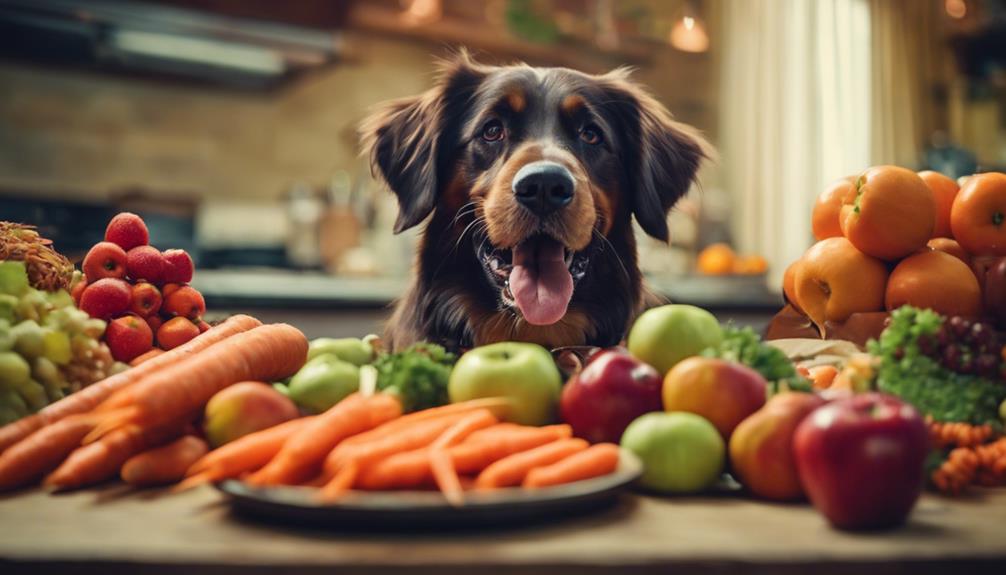
Choosing safe and healthy treats for dogs is essential for their well-being. Options like plain, cooked turkey without any bones are a great choice. It’s a high-protein snack that supports their dietary needs. Cooked sweet potatoes, green beans, and pumpkin are also excellent picks. These should be prepared without any seasonings to keep them dog-friendly. They’re full of fiber, which is good for their digestion.
For a bit of variety, a little cranberry sauce without added sugars can be a nice treat. It’s important to give these treats in moderation to avoid any stomach upset. These alternatives not only keep your dog healthy but also happy. It’s all about finding the right balance in their diet without compromising on nutrition or taste.
Emergency Response Guide
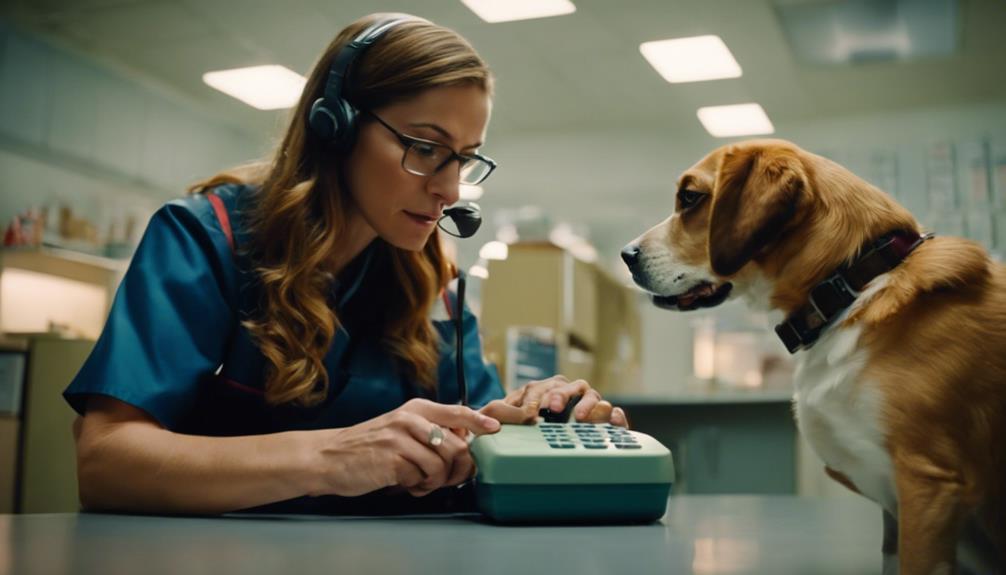
If your dog eats a doughnut, quick action is needed to avoid health issues. Doughnuts have a lot of fat and sugar, which are bad for dogs, and chocolate doughnuts can cause cocoa poisoning. Fast response is key.
Watch your dog for any bad reactions like throwing up or diarrhea. These are signs that the doughnut is causing problems. If these happen, call your vet right away. Getting advice from a vet is crucial.
Your vet might suggest not giving your dog any more food or water for a while. This can help stop the symptoms from getting worse.
Taking quick and informed steps is important to deal with the risks from eating something so sugary and possibly containing chocolate.
Frequently Asked Questions
What Happens if My Dog Ate Donuts?
- Dogs eating donuts risk sugar issues and digestive problems.
- Obesity and dental issues could follow.
- Pancreatitis and nutritional imbalance are possible outcomes.
Do Krispy Kreme Donuts Have Xylitol?
- Krispy Kreme donuts lack xylitol, safe for pets.
- Always check ingredients for sugar, prioritizing pet health.
- Avoiding hidden dangers in pet food requires vigilance.
Are Cinnamon Donuts Bad for Dogs?
- Dogs risk weight gain from sugary treats.
- Cinnamon toxicity could harm your pet.
- Treats may cause dental issues and pancreatitis.
Can Dogs Have Beignets?
- Beignets can lead to dog obesity and allergies.
- Choose homemade treats for better nutrition.
- Control treat portions for dog health.

